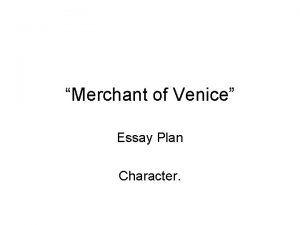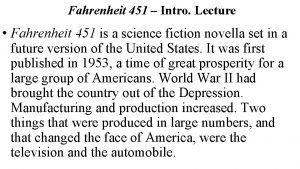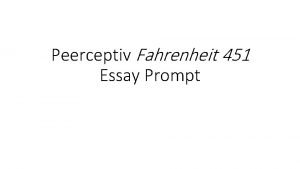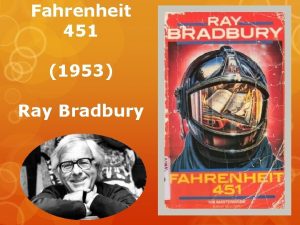Fahrenheit 451 Merchant of Venice Similarities Negative Stereotyp









- Slides: 9

Fahrenheit 451 Merchant of Venice

Similarities � Negative Stereotyp es � Isolation � Banned

Stereotypes • Both Fahrenheit and Merchant of Venice have negative stereotypes. This is of one of the Both Fahrenheit and Merchant reasons are both banned from Venice havethey negative stereotypes. Thisa few libraries. is one of the reasons they are both It is clear thelibraries. author is not aware of the banned fromthat a few which almost reflects It isstereotypes, clear that the author is not awarethe culture time they were of at thethe stereotypes, whichwritten. almost reflects the culture at the time they were written.

Stereotypes: Merchantofof. Venice Stereotypes: Merchant Thecharacteristicthatmakes Merchant of The Merchant of Venice most isfamous is itsracism. obvious most famous its obvious In racism. fact, if it. In fact, if for it wasn’t forthe Shylock, the play wasn’t Shylock, play would be Shakespeare’s work. Shakespeare’sleastinteresting work. Shylock He. He is evil, selfish, andand Shylockisisthe theantagonist. is evil, selfish, hateful. with money. In the hateful. He Healsoisisobsessed with money. In the play Shylock is hardly ever called by his name and play Shylock is hardly ever called by his name is instead referred to as The Jew. This reflects the and is instead referred as The This Renaissance view of Jewsto being evil, Jew. inhuman reflects the Renaissance view of Jews beings. evil, inhuman beings.

Stereotypes: Fahrenheit 451 Stereotypes : Fahrenheit 451 When Mildred and her friends are watching the TV, the talk about their children as being to TV, women the women about children as being much work than they are worth, and all they care too much are worth, all they about is appearance. They give the of care about is appearance. giveimpression the being very foolish and shallow. impression of being very foolish. Even and Mildred shallow. herself is perceived andair-headed self. Even Mildred herselfasisair-headed perceived as centered. In fact, nearly allnearly the women the book, and self-centered. In fact, all theinwomen except Clarisse, are portrayed as portrayed incredibly as in the book, except Clarisse, are superficial and brainless. incredibly superficial and brainless. This is is the stereotype that men in the 1950’s had of of women.

Isolation In both books the main character feels alone, abandoned, and thinks they are probably going to die. Merchant of Venice: Fahrenheit: � Antonio gets put in jail. � Montag is running away Shylock plans on beheading from a robot dog that is him. During that night in going to kill him. He jail, Antonio feels isolatedknows that he probably all he wanted to do is help won’t survive this, and he out a friend and now he is panics for his life. When going to die as a he is safe he realizes how consequence. He feels his lonely he is; his friends and friends have abandoned him. wife have abandoned him. And when the trial comes Antonio is panicking.

Direct Reference And you said quoting, ‘Truth will come to light, murder will not hid long!’ And I cried in good humor, ‘Oh God, he speaks only of his horse!’ And ‘The Devil can cite scripture for his purpose. ’

Direct Reference Truth will come to light, murder will not be hid long! � Meaning: the truth will eventually become known. In this passage Beatty is saying that in his dream Montag threatens that people will find out that there is more to life than their small bubble of pleasure. Oh God he speaks only of his horse! � Bradbury quotes this wrong. The original version says: He doth nothing but talk of his horse. This means that Beatty is saying that Montag is only thinking of himself. The Devil can cite scripture for his purpose. � Meaning: this can mean good things can end badly, or people that look good and nice can end up being bad. This quote can also summarize Beatty’s entire dream. Faber is playing the role of the angel, where Beatty is the devil. Faber (angel) is telling Montag to ignore Beatty (devil), who is twisting books (scripture) for his purpose.

T ! d n E he
















